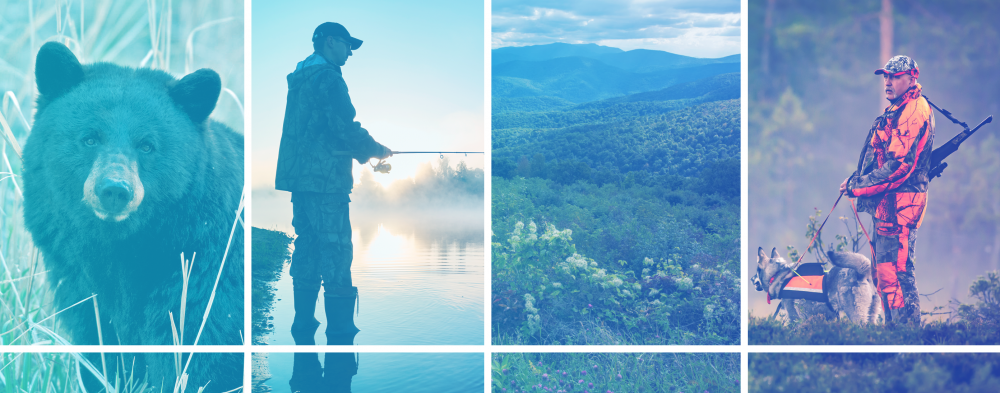Operations and Performance of the Department of Game and Inland Fisheries

WHY WE DID THIS STUDY
In 2017 the Joint Legislative Audit and Review Commission (JLARC) directed staff to review the operations, performance, and management of the Department of Game and Inland Fisheries (DGIF).
ABOUT
DGIF enforces hunting and fishing laws and regulations and undertakes a variety of activities to manage and conserve wildlife and habitat. The agency sold more than 1 million licenses, permits, or stamps to hunt or fish in FY19. DGIF owns 46 wildlife management areas and other property totaling more than 220,000 acres. The agency’s revenue comes from numerous non-general fund sources. DGIF employs about 440 staff. A new executive director was hired in mid-2019.
WHAT WE FOUND
DGIF has sufficient revenue to operate, though Virginia charges less to register boats and offers more exemptions than other states
DGIF’s revenue has not kept pace with inflation, but the agency does not appear to have a structural deficit between its revenue and key operational spending. The agency also has substantial fund balances it can access as needed to address any revenue shortfalls in the future.
Fees charged to obtain the privileges to hunt, fish, or register a boat are a major revenue source for DGIF. The fees Virginia charges to hunt and fish are generally similar to surrounding states. Virginia differs, though, from other states in several ways that reduce DGIF revenue. Virginia charges substantially less to register boats than other states. Virginia also typically grants more, and broader, exemptions from having to obtain a hunting or fishing license than surrounding states.
DGIF’s colonel position has been vacant for nearly 3.5 years
The conservation police force is headed by a colonel, but the position has been vacant since June 2016. During that time, staff have observed that “we lack direction and foresight” and there is a general lack of leadership and decisiveness on key issues. The colonel position has remained vacant for a variety of reasons, including a current statutory requirement for the director to determine that no current DGIF staff are qualified before filling the position with an outside candidate. The agency’s lack of a structured internal leadership development program has also contributed to challenges filling vacant leadership positions within the conservation police force.
The public reports CPOs are professional, but CPOs lack adequate procedural guidance to ensure consistent enforcement actions
Members of the public, when asked by JLARC, characterized conservation police officers (CPOs) as professional and helpful. Ninety-four percent reported that the CPO with whom they interacted operated in a professional manner; 83 percent reported that when requesting assistance, the CPO was helpful.
However, several indicators suggest that CPOs have been making law enforcement decisions for some time without adequate procedural guidance. DGIF is aware of this problem and is in the process of attempting to address it through improving guidance and seeking accreditation. Underscoring the need for improvement, only 30 percent of sergeants, lieutenants, and captains (who supervise CPOs) surveyed by JLARC reported that “all or most” procedural guidance was accurate. CPOs also gave varying responses to JLARC when asked how they might enforce certain laws and regulations. There is also some evidence of inconsistency in enforcement actions taken by CPOs over time.
Stakeholders cite the high quality of DGIF wildlife management and conservation staff and program
Conservation experts, federal officials, and stakeholder groups interviewed by JLARC staff indicated that DGIF’s conservation and management staff and programs are well regarded and respected. DGIF has a reputation for being an effective wildlife management agency. Experts and stakeholders indicated that DGIF has experienced and dedicated staff and is a leader among the states in certain program areas.
DGIF’s land acquisition process is generally effective but lacks necessary strategy and maintenance focus
A major focus of the agency’s conservation efforts is to purchase and conserve land as habitat for wildlife (and to be used recreationally through hunting, fishing, boating, wildlife viewing, and hiking). During the last few years, the agency spent more than $32 million to acquire 19 properties. DGIF has a generally effective process to decide which land to acquire, but it has not followed the process on some occasions. DGIF also lacks a meaningful and up-to-date land acquisition strategy. It also does not adequately budget and staff for the maintenance that will be required for its 220,000 acres of land holdings.
DGIF has several staffing and leadership issues that need attention
In a survey conducted prior to the recently appointed executive director assuming office, DGIF staff report being generally satisfied with their work and their ability to be productive. Staff also reported, though, concerns about the agency’s senior leadership team (including the prior executive director, but also current deputy director and division directors). Only one-third of all agency staff believed the agency’s senior leadership team identified and addressed agency challenges or motivated them to be effective. One staff member observed: “The senior leadership team is a black box. We have no idea what decisions they make or why.” Females and black employees also expressed certain concerns. For example, female and black employees were far less likely to be satisfied with DGIF’s work culture and opportunities for advancement than white male employees.
The recently appointed executive director is in a good position to attempt to engage in a purposeful effort to address these issues and gain staff confidence.
WHAT WE RECOMMEND
Legislative action
- Exempt the colonel position from the requirement to determine that a sufficient pool of candidates does not exist within the department before hiring an external candidate
- Require that at least one member of the Board of Game and Inland Fisheries be a senior law enforcement official
Executive action
- Fill the vacant colonel position no later than September 30, 2020
- Conduct additional training and provide additional guidance to ensure conservation police officers have a consistent understanding of enforcement actions and procedures
- Develop and implement a leadership identification and development program for conservation police officers
- Adhere to the agency’s internal land acquisition process and request an exemption from the Board of Game and Inland Fisheries before deviating
- Develop and follow a documented, meaningful and up-to-date, long-term land acquisition strategy
- Gain staff confidence through ongoing outreach, addressing staff concerns, and executing the agency’s internal communication plan
The complete list of recommendations and options is available here.

